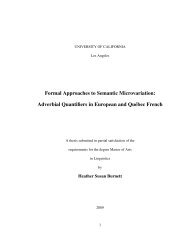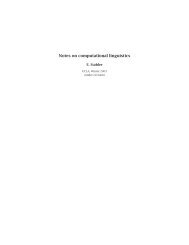Post Verbal Subjects and Agreement in Brazilian Portuguese
Post Verbal Subjects and Agreement in Brazilian Portuguese
Post Verbal Subjects and Agreement in Brazilian Portuguese
Create successful ePaper yourself
Turn your PDF publications into a flip-book with our unique Google optimized e-Paper software.
(67) is obvious [it [ CP that John is <strong>in</strong>telligent]] -> It is obvious that John<br />
is <strong>in</strong>telligent.<br />
(68) seems [it [ CP that Mary likes apples]] -> It seems [t [that Mary<br />
likes apples.]<br />
Although different <strong>in</strong> detail, this implementation is very rem<strong>in</strong>iscent of<br />
Rosenbaum’s (1967) approach to the derivation of extraposition, as well as Moro’s<br />
proposal for rais<strong>in</strong>g sentences. 16<br />
Pronom<strong>in</strong>alization of the small clause by pro-il will be achieved <strong>in</strong> a similar<br />
manner. For example, pro-it would pronom<strong>in</strong>alize the small clause complement of<br />
an unaccusative verb roughly as follows: 17<br />
(69) [ VP arrive [ pro-it [ SC [a girl] there]]]<br />
Now that some of the general assumptions of the proposal have been<br />
presented, we can proceed to see how the analysis will account for the patterns of<br />
agreement <strong>in</strong> BP.<br />
(i) *it believes [t [that Mary likes apple]].<br />
16 Though Rosenbaum proposed that the pronoun <strong>and</strong> the clause orig<strong>in</strong>ated <strong>in</strong> subject position <strong>in</strong> the<br />
first case, with extraposition of the clause to the right. Thus, (i) would be a closer representation of<br />
Rosenbaum’s analysis (65):<br />
(i) it that John is <strong>in</strong>telligent is obvious -> it t is obvious that John is <strong>in</strong>telligent.<br />
Moro’s (1997) analysis of rais<strong>in</strong>g constructions also differs from (68) <strong>in</strong> a similar way. He<br />
proposes that it is a predicate expletive tak<strong>in</strong>g a clause as an argument, thus propos<strong>in</strong>g the follow<strong>in</strong>g<br />
merge order:<br />
(ii) [[CP that Mary likes apples] it]<br />
I will adopt the order <strong>in</strong>spired by Kayne (2002) <strong>in</strong> the text for simplicity of presentation. However,<br />
slightly chang<strong>in</strong>g my proposal to adopt Moro’s merger order should not be too problematic if<br />
necessary, given the possibility of predicate <strong>in</strong>version of it, allow<strong>in</strong>g for it to reach spec-TP <strong>in</strong><br />
Moro’s approach.<br />
17 Note that it does not follow that SCs necessarily have be pronom<strong>in</strong>alized.<br />
22

















